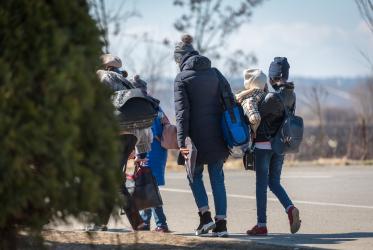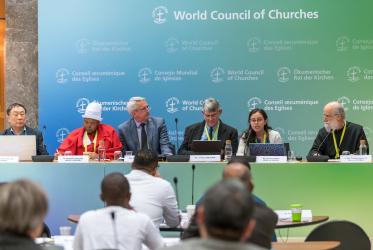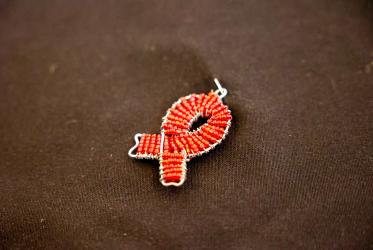The Church in Africa in face of HIV/AIDS Pandemic
Message issued by Symposium of Episcopal Conferences of Africa and Madagascar (SECAM)
Dakar, Senegal
7 October 2003
Dear brothers and sisters in the faith,
Dear friends, fellow believers and all people of good will,
"Grace to you and peace from God our Father and the Lord Jesus Christ!" (1 Cor. 1:3).
We, Cardinals, Archbishops and Bishops of Africa and Madagascar greet you in faith and with warm affection. Gathered in the 13th Plenary Assembly of our Bishops Conferences of Africa and Madagascar (SECAM) we have taken up the AIDS pandemic and its horrible consequences. In doing so we have been very close to you, our dear brothers and sisters who are infected and affected by HIV/AIDS and also of you who have been moved to join in the fight against the scourge of AIDS.
I. We are in solidarity.
"For just as the body is one, and has many members, and all the members of the body, though many are one body, so it is with Christ"
(1 Cor. 12:12).
This eloquent image expresses well the solidarity that we feel towards all who suffer, but especially towards you our Christian brothers and sisters, who are one single body, with millions who make up the communities of Africa and Madagascar. It is on you that we call to join together in confronting the pandemic whose gravity no one can ignore.
May this solidarity be matched by a keen awareness of the seriousness of the threat facing us. Millions of lives have already been lost prematurely, whole families dismembered and untold numbers of children orphaned and/or infected by HIV. And it is they above all who need protection, nurture, housing, education and adult parents.
II. Let's be true to ourselves.
As heads of our Christian communities, we commit ourselves to making available our Church's resources be they our educational and healthcare institutions or social services. We will work closely with all funders who are disposed to support and work with Christian and faith-based organisations. We are open to partnerships with them and others who are happy to put their resources to work in the struggle, and do so knowing well that we work according to our Gospel convictions. For "man does not live by bread alone, but by every word that issues from the mouth of God" (Mt 4: 4).
The morality we teach in God's name seeks to respect and affirm human life which gets its value and dignity from the fact that it is the inviolable gift from our Father who creates every human being and calls everyone to the fullness of life. Therefore abstinence and fidelity are not only the best way to avoid becoming infected by HIV or infecting others, but even more are they the best way of ensuring progress towards lifelong happiness and true fulfilment.
"Never give in then, brothers and sisters, never admit defeat; keep on working at the Lord's work always, knowing that, in the Lord, you cannot be labouring in vain" (1 Cor 15: 58).
III Let's change behaviour
Besides teaching the morality of the Church and sharing her moral convictions with civil society, and besides informing and alerting people to the dangers of HIV-infection, we want to educate appropriately and promote those changes in attitude and behaviour which value abstinence and self-control before marriage and fidelity within marriage. We want to become involved in affective and sexual education for the life to help young people and couples discover the wonder of their sexuality and their reproductive capacities. Out of such wonder and respect flow a responsible sexuality and method of managing fertility in mutual respect between the man and the woman.
This type of education can only be undertaken effectively with the active collaboration of lay men and women who not only speak about principles of morality but also, as youth and as couples, give living testimony that fidelity to these moral principles yields a humanising and fulfilling affective and sexual life. Such education also contributes to promoting healthy and stable families, and these are the best prevention against AIDS. Organizations1 which specialise in such education for young people and for couples exist throughout Africa and are having a small but gratifying degree of success. We give them the support and encouragement they deserve.
IV Let's be responsible.
The solidarity that we spoke of earlier binds us to joint responsibility in tackling the global and complex challenges facing us: interminable and recurrent wars, conflicts and violence in which rape is often used as a weapon, not just psychologically violent but physically destructive through HIV/AIDS!
We have also come to realise that poverty goes hand in hand with HIV and AIDS. It concerns us that our already fragile economies should be further weakened with much of the trained labour force lost to HIV and AIDS. Poverty facilitates the transmission of HIV, makes adequate treatment unaffordable, accelerates death from HIV-related illness and multiplies the social impact of the epidemic.
In all these senses, "Let all the parts [of the one body] feel the same concern for one another" (1 Cor 12:25). This solidarity among us and this fidelity to our faith, this resolve to change behaviour and assume our entire responsibility for the future of our continent, now take concrete form in the following Plan of Action. We pass it on so that you can also make it yours.
PLAN OF ACTION
We, Cardinals, Archbishops and Bishops of SECAM, propose to the members of the clergy, brothers and sisters in religious life, to the faithful and all people of good will, the following plan of action:2
I. In solidarity with you, we commit ourselves to:
-
Utilise and increase the human, material, and financial resources dedicated to address the situation of HIV and AIDS in our communities, and to identify focal points in parishes, dioceses, and national Episcopal conferences in order to assist with gathering information and development of programme strategies. In this same effort, we are committed to coordinating our efforts at the continental level in the struggle against the pandemic.
-
Make sure that the health services of the Church, the social services and the educational institutions respond appropriately to the needs of those who are ill with AIDS.
-
Focus on the particular vulnerability of girls and the heavy burden on women in the context of the HIV pandemic in Africa.
-
Advocate vigorously for access to treatment for those who are prevented from obtaining it through poverty and structural injustices.
-
Involve those who are knowledgeable about traditional medicines and other natural remedies in research into means of struggling against AIDS.
II. Faithful to our Gospel convictions, with you we commit ourselves to:
-
Collaborate with other Christian confessions and with people of other faiths working in their respective communities to support those affected and infected by HIV/AIDS.
-
Promote closer partnerships with civil society, the business sector, governments, the United Nations, international and intergovernmental agencies, and particularly with organisations of people living with HIV and AIDS, in order to increase the capacity for care and support, without diluting our evangelical convictions.
III. Facing the serious threat of AIDS, with you we are committed to:
-
Promote changes of mentality, attitude and behaviour necessary for confronting the challenge of the pandemic.
-
Work tirelessly to eradicate stigma and discrimination and to challenge any social, religious, cultural and political norms and practices which perpetuate such stigma and discrimination.
-
Play a major role in eradicating the damaging myths of stigma and discrimination by facilitating Voluntary Counselling and Testing (VCT) so that those who are infected might benefit from the care and support they need. This will also help better to control mother-to-child transmission.
-
Advocate with government at all levels and with inter-governmental organizations to establish policy priorities that adequately support those affected by HIV and AIDS, that provide access to care and treatment and a life of dignity for people living with HIV and AIDS, and that implement the commitments made at various other inter-governmental meetings.
IV. In shared responsibility with you, we commit ourselves to:
-
Develop educational programmes which integrate the theme of HIV/AIDS in theology and religious formation. These programmes will also include moral principles and practical skills for promoting healthy relationships and a well-integrated sexuality.
-
Promote and deepen theological reflection on the virtues of compassion, love, healing, reconciliation, and hope, all of which are capable of confronting the judgement, shame, and fear that so often are associated with HIV and AIDS.
-
Organize workshops at the regional, national, diocesan and parish levels in order to increase accurate knowledge and sensitivity around all HIV and AIDS-related issues relevant to our Church.
-
Encourage people living with HIV/AIDS or affected by it to become actively involved, in our local communities, as resource persons in the struggle against the pandemic.
V. Finally, as pastors of the church family of God in Africa in a time of AIDS, we want to:
-
Train clergy, religious, and committed laity to accompany people living with and affected by HIV and AIDS with prayer and spiritual counselling.
-
Provide doctrinal, spiritual and social formation, and the best possible professional training, for those willing to become involved in caring for and accompanying those who are living with and affected by HIV/AIDS.
-
Welcome people living with HIV and AIDS in a warm, non-judgemental and compassionate manner in our churches and ensure them a "place at the table of the Lord."
-
Provide the sacraments and sacramentals, as appropriate and requested, to Catholics living with the virus.
-
Put into action the challenge addressed by our Holy Father Pope John Paul II to the Church in our continent through his Apostolic Exhortation, Ecclesia in Africa
"The battle against AIDS ought to be everyone's battle. Echoing the voice of the Synod Fathers, I too ask pastoral workers to bring to their brothers and sisters affected by AIDS all possible material, moral and spiritual comfort. I urgently ask the world's scientists and political leaders, moved by the love and respect due to every human person, to use every means available in order to put an end to this scourge."3
We intend to create an HIV/AIDS service on the Continental level in order to assist us in implementing our Plan of Action.
(Signed) Symposium of Episcopal Conferences of Africa and Madagascar (SECAM) in plenary session, Dakar, Senegal, 7th October, 2003.
1 Education for Life, Youth Alive, Action Familiale, Pro Vifa
2 These recommendations are partly based on the Plan of Action prepared at the African Religious Leaders Assembly on Children and HIV/AIDS, Nairobi, 9-12 June 2002, and on the Proposed HIV/AIDS Plan of Action prepared at the SECAM Meeting of Secretaries General, Johannesburg, 24-27 October 2002.
3 Pope John Paul II, Ecclesia in Africa, 14 September 1995, #116.





